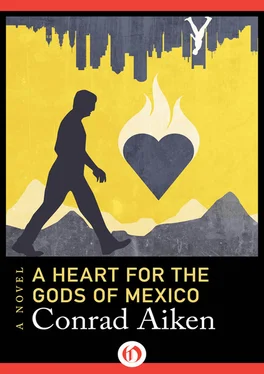He pressed his hands hard to his forehead as he sat down, leaned into the corner by the window, willed himself to sleep. Sleep, Blom; sleep. You must sleep. And what better than a train, a day coach, with that nostalgic whistle, far ahead, for a lullaby. And these square wheels, these octagonal wheels. And Noni lying there, looking so extraordinarily well, so young and pretty, as if nothing in the world was the matter!
Footsteps passing, and a change of light through the closed eyelids.
“Can’t help it if she did.”
“By no means.”
Steps, voices, wheels, and in no time at all to an accompaniment of wind sound, a prolonged wind sound, he crossed the Texas desert on foot, up and down the sand hills, through ravines of rock and sage, and then more precipitately into Mexico, but repeatedly lost. No road, no path, no guide. But at last a single sign post, a finger of wood, woebegone in the wilderness, and on it in almost obliterated letters the one word Mexico. Southward, timelessly southward once more, through the wilderness of rock and sand, day after day and night after night; and over the bronze mountains, the eagle-haunted sierras, sawtoothed and jagged against the sky, and then at last the long descent into the fertile valley. Now before him, far down, he could see the city itself, the strange city; light flashed from the bright roofs and domes; light flashed too from something else — was it water? He could not be sure, but already now he was in a house of his own in the old city, he had been a citizen in this strange place for a long time, he knew it well. And nevertheless, it was with surprise — although also with familiarity — that he found the house to be built in water, for lifting a trap door in the floor he stared straight down through a water so marvelously pure and clear, and so deep, that it seemed to him he was looking into the very center of the earth. Like a crystal it was, and as he gazed into its wonderful depths, lucid and sunlit, and yet somehow also dark, he had the feeling that here below him was a profound meaning, something that he had come a long way to find. This was Mexico, this underworld sea, it was this he had come to live in, this was his soul’s dwelling place, and Noni’s too — he was holding a candle up now, and looking down in the less light, wondering what creatures inhabited this dark water, when abruptly the walls of the house began to shake, everything shook violently as if in an earthquake, the breath suddenly left his body—
Angry and dismayed, he saw the brakeman’s hand just leaving his shoulder; the brakeman’s hand had been shaking his shoulder; the brakeman was still standing before him, lantern in hand. He blinked at the white-gloved hand, felt as if he were still being shaken. And the brakeman was still saying — or saying again:
“Galion in five minutes; change for St. Louis.”
“Galion—”
He jumped up, turned, saw Gil just rising also, with his spectacles in his hand. Noni, on the other side of the aisle, lay exactly as she had before, but now her eyes were open, she looked from one to the other of them with a sleepy half-smile.
“Five minutes, my lambs; we’ve got to hustle! We’ve got to get a move on! This is no less than Galion, believe it or not; Galion : and God help us if we don’t find that train to St. Louis. Come on, shake a leg, Noni! Wake up!”
“I am awake!”
“Gil, you’d better spank the gal.”
“Of all the unearthly hours to make poor long-suffering travelers change — it’s peonage, that’s what it is, Blom, to push the coach passengers off — you notice the Pullmans go right through!”
Gil reached up to the rack for his suitcase, Noni for her hat. The engine’s quadruple cry, far ahead, came softly and unevenly back to them; all three looked out into the starless and lightless night, the unbroken dark. One after the other, the six salesmen, their coats neatly folded over their arms, their smart bags in their hands, passed them, going forward into the vestibule. A feeling of departure was in the air, a severance, a feeling of hurry — the future was reaching back to them with secret and powerful hands, they must bend their wills to it. Out into the unknown, bag in hand — but Gil, characteristically, had quite forgotten Noni’s hatbox and gladstone, Noni was climbing up on to the seat—
“Stop that, Noni — you let me do that—”
Too late, Gil stepped forward, peering and smiling, apologetic; Noni half fell, half jumped, the train swaying suddenly, and flung her arms round him laughing, while Blomberg reached over their heads for the shiny hatbox.
“Can I have this dance, Noni?”
“I suppose we ought to make it a rhumba! or a toltec , or something.…”
The train sounds were changing, changing and slowing, the car lurched and shuddered, its speed resisting the brakes, it seemed to balloon and sway like a zeppelin. Blomberg said, looking down at Noni’s blue wings, and below them the now sobered blue eyes:
“Now have you got everything? What you fellers need to learn is organization.”
He smiled grimly and consciously straight into Noni’s eyes, looked for a moment deep down into them — for all the world as he had looked into the mysterious water in his dream — and sought there an answer to the question which he dared not ask. Far and faint, too, the signal came — like a tiny light at the very horizon’s edge, seen once, seen twice, then gone. It was both reassurance and reproach, a “yes, I’m all right,” but also a “now you must stop looking at me like that, or Gil will guess.” The eyes wavered aside then, shyly, the lips were half parted, as if she had thought to say something but had changed her mind. She turned quickly then to Gil, behind her, touched the tweed sleeve.
“My book,” she said.
“Gosh, yes! Where is it?”
“Can you put it in your pocket. I forgot to pack it.”
The sound of time grew louder, a bell rang with two-voiced melancholy across a roar of steam, the forward door was slammed open, and in it stood the brakeman with his lantern. Galion, he was singing; Galion! They had come to Galion; this point in chaos and eternal night was Galion. To get off. To go out into the night and look for another train, or wait for it, or miss it! To hurry! And with sleep still blinding one’s eyes—
“Come on,” he said.
He took Noni’s gladstone, and his own bag; Gil had his broken suitcase and an armload of coats; Noni had the hatbox. The train shuddered and slowed, gave a final prolonged squeal, and stopped. In the unnatural silence, they stepped down the steep lamplit stairs into the featureless black of night, found themselves walking stiffly on gravel. The six salesmen had vanished into the profound gloom, only their footsteps could be heard dying away somewhere ahead. The brakeman was saying:
“Straight on, St. Louis train on the other side, you’ll have to walk round both trains, and cross the tracks up ahead — straight ahead—”
“Good heavens,” Gil said, “there’s nothing here—!”
Noni lifted her face to the starless sky — he could just see her.
“It’s the Black Hole of Calcutta,” she said.
They walked quickly into the night, past the lighted car which they had just left, and another, and, reaching the end of the train, crossed the track to the mysterious new train which stood beyond. Somber and unlit, save for a faint glow from the vestibules, the interminable row of dark sleeping cars stretched ahead of them, apparently for miles. The salesmen had disappeared entirely, not a sound was to be heard save their own quick footsteps on the dry gravel. Suppose they took too long in getting round — suppose the train started — how could anyone possibly tell whether all the passengers had found their way from one train to the other? A feeling of panic hurried his heart’s beating, he thought he heard Noni give a little gasp, peered sidelong toward her but could see nothing of her expression. He said:
Читать дальше












